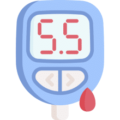Author(s)
Kirstie Perry, PharmD
Reviewed By
Jaini Patel, PharmD, BCACP
Regina Arellano, PharmD, BCPS
Podcast Case Study: ASA Use in DM – Is the Evidence ASCENDing?
Aspirin is no doubt beneficial in patients with overt vascular disease for the secondary prevention of myocardial infarction, stroke, or cardiovascular death. However, evidence supporting use of aspirin for primary prevention in patients who have not had a cardiovascular event is far less compelling. The 2009 Antithrombotic Trialists’ Collaboration (ATTC) meta-analysis of 95,000 low-risk patients in 6 primary prevention trials demonstrated a modest 12% relative risk reduction in serious vascular events in patients receiving aspirin.1 However, much of this benefit was offset by a proportional increase in major gastrointestinal and other bleeds. Less than 5% of the patients in these trials had diabetes. Diabetes is a known risk factor for cardiovascular events, increasing its risk by 2- to 3- fold.2 Given the global epidemic of diabetes and rapidly increasing prevalence of the disease worldwide, implementing effective strategies for the primary prevention CVD is of paramount importance.
Since the publication of the ATTC trial, there have been two studies focused on primary prevention of cardiovascular events in patients with diabetes. The results of the Prevention of Progression of Arterial Disease and Diabetes (POPADAD) trial failed to support the use of aspirin given over 6.7 years in adults aged > 40 with diabetes and reduced ankle-brachial index.3 Similarly, the Japanese Primary Prevention of Atherosclerosis with Aspirin for Diabetes Trial (JPAD) failed to show significant reduction of cardiovascular events with low-dose aspirin use in patients with type 2 diabetes without atherosclerotic disease over a median follow-up of more than 4 years.4
The clinical uncertainty of aspirin use for the primary prevention of CV events in patients with diabetes is reflected in the different recommendations in current guidelines. The American Diabetes Association recommends use of aspirin in primary prevention for men and women > 50 years with diabetes and at least one additional major risk factor (family history of premature ASCVD, hypertension, dyslipidemia, smoking, or chronic kidney disease/albuminuria) who are not at increased risk of bleeding (older age, anemia, renal disease).5 The U.S. Preventive Services Task Force recommends low-dose aspirin for prevention of CVD in patients aged 50 to 59 years with 10-year cardiovascular risk at least 10%.6 In contrast, the 2015 UK National Institute for Health Care Excellence (NICE) guideline and the 2016 European Guidelines have recommended against the routine use of antiplatelet therapy in patients with type 2 diabetes.7,8
The investigators of the ASCEND (A Study of Cardiovascular Events in Diabetes) trial set out to determine the safety and efficacy of daily aspirin use, compared with placebo, in patients with diabetes without known occlusive arterial disease.5 ASCEND was a randomized, placebo-controlled trial that assigned patients to enteric-coated aspirin 100 mg daily or placebo. Between June 2005 and July 2011, more than 15 thousand patients aged > 40 years with diabetes and no known cardiovascular disease were randomized into the study (see Table 1). The primary efficacy outcome was the first serious vascular event defined as a composite of nonfatal MI, nonfatal stroke or TIA, or death from any vascular cause. The primary safety outcome was the first occurrence of any major bleeding event defined as a composite of any confirmed intracranial hemorrhage, sight-threatening bleeding event in the eye, gastrointestinal bleeding, or any other serious bleeding. Secondary outcomes were gastrointestinal tract cancers and the composite of any serious vascular event or any arterial revascularization procedure.
Table 1. Baseline Characteristics
|
Characteristic |
Aspirin Group |
Placebo Group |
|
Age, mean (SD) |
63.2 (9.2) |
63.3 (9.2) |
|
Male sex |
62.6% |
62.5% |
|
White race |
96.5% |
96.5% |
|
Body mass index, mean (SD) |
30.8 (6.2) |
30.6 (6.3) |
|
Smoking Status |
|
|
|
Current smoker |
8.3% |
8.3% |
|
Former smoker |
45.6% |
45.5% |
|
Never smoked |
45.1% |
45.1% |
|
Unknown |
1.1% |
1.1% |
|
Participant-reported hypertension |
61.6% |
61.6% |
|
Statin use |
75.6% |
74.9% |
|
Type 2 diabetes |
94.1% |
94.1% |
|
Duration of diabetes, median (interquartile range) – yr |
7 (3 – 13) |
7 (3 – 13) |
|
Systolic blood pressure, |
136.1 (15.2) |
136.2 (15.3) |
|
Vascular risk score* |
|
|
|
Low (< 5% risk) |
40.4% |
40.5% |
|
Moderate (5% – <10% risk) |
42.6% |
42% |
|
High (>10% risk) |
17% |
17.4% |
*Baseline 5-year risk of serious vascular event determined using Poisson regression
Over a mean follow-up of 7.4 years, serious vascular events were significantly lower in the aspirin arm than in the placebo group (8.5% vs. 9.6%; rate ratio 0.88; 95% CI 0.79 – 0.97; P = 0.01). In exploratory analysis, the benefits were seen mainly in the first 5 years of treatment. Major bleeding events were higher in the aspirin group compared with placebo (4.1% vs. 3.2%; rate ratio 1.29; 95% CI, 1.09 – 1.52; P = 0.003). Of the first major bleeding events, 41.3% were gastrointestinal (of which 62.3% were in the upper gastrointestinal tract), 21.1% were sight-threatening bleeding events in the eye, 17.2% were intracranial bleeding events, and 20.4% were bleeding events in other sites. There was no significant difference between aspirin and placebo in the incidence of gastrointestinal tract cancer (2% vs. 2%), however, the trial will continue to follow patients long-term for these outcomes.
Strengths of the ASCEND trial include a large number of participants, long duration of follow-up, and a randomized, placebo-controlled trial design. It should be noted that the majority of participants had well-treated diabetes, with an average baseline A1C of < 8%. Moreover, most participants had other well-managed cardiovascular risk factors with more than 70% on statin therapy at baseline. Slightly more than 17% of participants were categorized as high vascular risk. For these reasons, the results may not apply to patients with more poorly controlled diabetes or at higher risk for cardiovascular events.
Interestingly, the investigators found an increased incidence of major bleeding events with increased vascular risk, however these findings are a bit uncertain due to the small number of events and differences in medication adherence. But this finding raises the possibility that the risks of aspirin may outweigh its benefits even in those at high cardiovascular risk. Additional studies will be needed to evaluate the benefit of aspirin therapy in patients with diabetes in higher cardiovascular risk groups.
About one quarter of the participants were receiving proton pump inhibitor (PPI) therapy near the trial’s end. Given that 41.3% of major bleed events were gastrointestinal in nature, it raises the question about whether GI bleeding in the aspirin arm could have been mitigated with routine PPI use.
The investigators concluded that the use of daily low-dose aspirin reduces the risk of serious vascular events in patients with diabetes without evident cardiovascular disease but the benefits were outweighed by higher rates of major bleeding. Moreover, aspirin did not reduce the risk of gastrointestinal tract or other cancers over the trial period.
The use of aspirin for the primary prevention of CV events has been questioned in two other recent randomized controlled trials. In the Aspirin in Reducing Events in the Elderly (ASPREE) trial (n=19,114), aspirin therapy significantly increased rates of major hemorrhage with no effect on disability-free survival.10-12 Although the Aspirin to Reduce Risk of Initial Vascular Events (ARRIVE) trial (n=12,546) did not enroll patients with diabetes, daily aspirin use did not reduce major cardiovascular events in a population of moderate-risk patients (10 – 20% 10-year coronary heart disease risk score, excluding patients with diabetes).
So, what do the results of ASCEND, the largest trial of aspirin therapy for the primary prevention of cardiovascular disease in diabetes ever conducted, mean? For me, ASCEND offers valuable insight regarding the priorities for preventive cardiovascular care in patients with diabetes. With the majority of participants representing a cohort of patients with well-controlled diabetes who were taking multiple antihypertensives as well as statin therapy, ASCEND gives a better sense of the benefits (and risks) of aspirin therapy in a modern context. Bottom line, daily low-dose aspirin has no net benefit if other cardiovascular risks are appropriately addressed. What do you think? Should we continue to recommend aspirin for the primary prevention of cardiovascular events? And if so, to whom?
- Antithrombotic Trialists’ Collaboration. Aspirin in the primary and secondary prevention of vascular disease: collaborative meta-analysis of individual participant data from randomised trials. Lancet 2009;373:1849-60
- Sarwar N, Gao P, Seshasai SR, et al. Diabetes mellitus, fasting blood glucose concentration, and risk of vascular disease: a collaborative meta-analysis of 102 prospective studies. Lancet 2010;375:2215-22.
- Belch J, MacCuish A, Campbell I, et al. The Prevention of Progression of Arterial Disease and Diabetes (POPADAD) trial: factorial randomised placebo controlled trial of aspirin and antioxidants in patient with diabetes and asymptomatic peripheral arterial disease. BMJ 2008;337:a1840
- Ogawa H, Nakayama M, Morimoto T, et al. Low-dose aspirin for primary prevention of atherosclerotic events in patients with type 2 diabetes: a randomized controlled trial. JAMA 2008;300:2134-41
- American Diabetes Association. 9. Cardiovascular disease and risk management: Standards of Medical Care in Diabetes – 2018. Diabetes Care 2018;41(Suppl. 1):S95-96.
- Bibbins-Domingo K. Aspirin Use for the Primary Prevention of Cardiovascular Disease and Colorectal Cancer: U.S. Preventive Services Task Force Recommendation Statement Aspirin Use for the Primary Prevention of CVD and CRC. Ann Intern Med 2016;164:836-45
- National Instituted for Health and Care Excellence. Type 2 diabetes in adults: management. NICE guideline [NG28];2015.
- Piepoli MF, Hoes AW, Agewall S, et al. 2016 European Guidelines on cardiovascular disease prevention in clinical practice. The Sixth Joint Task Force of the European Society of Cardiology and Other Societies on Cardiovascular Disease Prevention in Clinical Practice (constituted by representatives of 10 societies and by invited experts) Developed with the special contribution of the European Association for Cardiovascular Prevention & Rehabilitation (EACPR). Eur Heart J 2016;37:2315-81.
- ASCEND Study Collaborative Group. Effects of aspirin for primary prevention in persons with diabetes mellitus. N Engl J Med 2018. DOI: 10.1056/NEJMoa1804988.
- McNeil JJ, Woods RL, Nelson MR, et al. Effect of aspirin on disability-free survival in the healthy elderly. N Engl J Med. 2018. DOI: 10.1056/NEJMoa1800722.
- McNeil JJ, Wolfe R, Woods RL, et al. Effect of aspirin on cardiovascular events and bleeding in the healthy elderly. N Engl J Med. 2018. DOI: 10.1056/NEJMoa1805819.
- McNeil JJ, Nelson MR, Woods RL, et al. Effect of aspirin on all-cause mortality in the healthy elderly. N Engl J Med. 2018. DOI: 10.1056/NEJMoa1803955.
- Gaziano JM, Brotons C, Coppolecchia R, et al. Use of aspirin to reduce risk of initial vascular events in patients at moderate risk of cardiovascular disease (ARRIVE): a randomised, double-blind, placebo-controlled trial. Lancet. 2018. pii: S0140-6736(1 8)31924-X. DOI: 10.1016/S0140-6736(18)31924-X.



 iForumRx.org is a web-based community of practice designed to inform ambulatory care pharmacy specialists, pharmacy residents, and student pharmacists about high-quality, practice-changing evidence.
iForumRx.org is a web-based community of practice designed to inform ambulatory care pharmacy specialists, pharmacy residents, and student pharmacists about high-quality, practice-changing evidence.